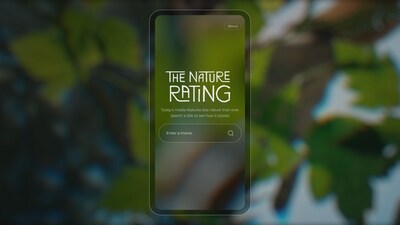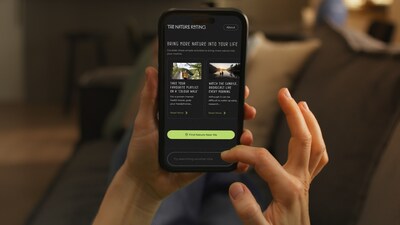IS OUR 'NATURE DEFICIT' AT A TIPPING POINT? NEW REPORT REVEALS DISCONNECT FROM THE NATURAL WORLD
- New report from Super, Natural British Columbia®, the official tourism body of British Columbia, Canada reveals 46% of people feel there's a 'nature deficit' in the media and culture they consume.
- Gen Z spends 25% less time in nature than when Gen X were the same age, despite craving a break from screens
- Parents express deep concern, with new research revealing the average child now spends less than an hour in nature per day
- City dwellers are most at risk, with more than 60% of people living in inner cities and urban areas agreeing they can go days without going outside
- New 'Nature Rating' tool analyses nature content in media to inspire-real world connection, based on the psychological principle that the more you experience nature in culture, the more you'll seek it out in real life
NEW YORK, Sept. 16, 2025 /PRNewswire/ -- There is a growing 'nature deficit' in the modern world, reflected in everything from the media people consume to their limited time outside. A new report released today from Super, Natural British Columbia, the official tourism body of British Columbia, Canada, highlights a rising disconnect to nature.
The 'Nature Report,' which surveyed 2,000 adults in the US, uncovers a complex relationship with the natural world. While Gen Z reports a stronger desire to escape their screens, they are also the generation spending the least amount of time in nature, citing barriers like urban living and digitally-focused social lives. The findings show that while younger generations are leading a charge back to nature post-pandemic, they still spend significantly less time outside than previous generations did.
Super, Natural British Columbia exists to bring people and nature closer together. The shocking new findings underscore just how urgent that mission is, driving the launch of TheNature Rating, a first-of-its-kind, free digital tool. It analyzes how much nature is present in the media people engage with every day to help them assess and improve their nature deficit. This is based on the psychological principle that the more you experience nature through culture, the more you'll seek it out in real life.
Key Findings from The Nature Report:
The Generational Nature Gap: The report reveals a stark generational divide in nature engagement. While 42% of Americans generally feel their generation is more connected to nature than previous generations, this sentiment varies across age groups. Boomers and Gen X are most likely to spend significant time outside, Gen Z, despite being more vocal about environmental issues, lags behind, with 26% of Americans generally feeling their generation is less connected to nature.
- While 67% of Gen Z report being inspired by media and pop culture to spend more time outside, they average just under 49 minutes of outdoor time on weekdays with Gen X clocking in at 65 minutes. This is mostly just to commute to work.
- This is a 25% decrease compared to what Gen X reported, even as Gen Z leads the charge in consuming nature-themed content online.
- Nearly two-thirds of Gen Z (67%) admit they can go days without stepping outside, pointing to a growing disconnect with nature.
Parental Concerns for the Next Generation A significant portion of parents are worried about their children's relationship with nature.
- Half of parents (50%) say their children spend more time outdoors than they did at the same age, but 25% still believe their children spend less time outside than they did at that age, and 26% still want them to spend even more time outside.
- About 19% of parents are concerned their children aren't engaging with nature enough, with the average child spending just 56.17 minutes in unstructured play or nature per day.
- Parents cite increased screen time (36%), busy family schedules (32%), and weather (25%) as the biggest reasons their children might spend less time outside.
The Urban-Rural Divide Where people live has a direct impact on their nature engagement, with city dwellers facing the biggest deficit.
- 67% of city residents say they can go days without stepping outside. Many cite bad weather (25%), not having enough hours in the day (16%), boredom (16%) or disliking being alone (17%) as reasons for staying indoors.
"The benefits of spending time in nature are widely known, but modern life can make it difficult, with our research showing that we're becoming more disconnected from nature with each generation," said Maya Lange, Vice President, Global Marketing for Super, Natural British Columbia. "While there's no single solution to inspiring people to improve their relationship with nature, encountering the wonder of it through the content they watch and enjoy can spark a genuine desire to seek nature out in real life. The Nature Rating is designed to help people take a first step - assessing nature in content they consume can inspire people to go outside and foster a stronger connection to the natural world."
The Link Between Consuming Nature Content and Engaging with Nature
The report also highlights a crucial insight: consuming media with the presence of nature inspires real-world action.
- A significant majority (67%) of people said that seeing the natural world on their screens directly inspires them to want to experience nature themselves. This inspiration primarily stems from social media (36%), YouTube/Reels (35%), and TV shows (32%) being the most influential. Top TV/movie influences include Yellowstone (21%), Our Planet (16%), and Survivor (14%).
"Our research published in Perspectives on Psychological Science found that references to nature in songs, books, and films have been on a steady decline since the 1950s. This is symptomatic of a larger societal issue, as there is a strong link between what we consume and how we behave." said Social Psychologist Dr. Pelin Kesebir. "Art, media, and culture both reflect and shape our lived experiences, so the nature deficit in the content we consume signals a broader and concerning disconnect from the natural world. That's why tools that encourage a healthier 'nature diet' in our media can be a powerful catalyst for inspiring real-world nature engagement."
The Solution: Introducing The Nature Rating
To help bridge this gap, Super, Natural British Columbia has launched The Nature Rating, a first-of-its-kind digital tool that analyzes the media you consume, or are considering consuming, so you can consciously bring more nature into your media habits, and ultimately engage more with the natural world.
- How it Works: The Nature Rating uses a sophisticated model combining artificial intelligence (AI) and natural language processing to analyse the nature content in media titles (films, shows, books, songs) against a list of over 270 nature-related keywords. By cross-referencing data from multiple open-source databases, it analyzes the themes, plots and lyrical content to assign a Nature Rating score out of 10. This helps users understand the prevalence of nature in their favorite content.
- Inspiring Action: Based on the rating given for a title, it recommends other highly rated media, as well as simple, actionable ways to find nature nearby, improve your nature deficit and let the outside in. The core idea is that the more you experience nature in culture, the more you'll seek it out in real life.
Today's media features less nature than ever, a trend made quantifiable by The Nature Rating. Award-winning films and chart-topping music from the last 50 years reveals a clear and steady decline in nature-related themes. This pattern continues with current pop culture; for example, one of this year's most-watched Netflix movies, K-pop Demon Hunters, scores a surprisingly low Nature Rating of just [3/10]. Top hits, including this year's Grammy-winning "Not Like Us" by Kendrick Lamar and Oscar Best Picture winner Anora score a mere 1/10, highlighting just how little nature is represented in today's most celebrated cultural moments.
The Nature Rating is a free resource available to everyone. To discover how much nature is present in a film, show, book or song title and be inspired to seek nature in everyday life, visit www.thenaturerating.com.
Notes to editors:
Based on research conducted for Super, Natural British Columbia by OnePoll.com between August 22 -27, 2025, among nationally representative samples of 2,000 UK adults and 2,000 US adults.
Contact details:
For media enquiries please contact destinationbc@VCCP.com
About Super, Natural British Columbia
Super, Natural British Columbia® is the globally recognized brand of Destination British Columbia, the provincial tourism marketing and management organization of British Columbia, Canada. For over 40 years, Super, Natural British Columbia®has represented the diversity and beauty of Canada's westernmost province and inspired millions of travellers to visit British Columbia - a place of powerful nature, rich cultures, and unforgettable stories waiting to be discovered. The Super, Natural British Columbia® brand's purpose is to bring people and nature closer together. We believe that by restoring our connection to nature we can better connect to ourselves, each other and the world.
![]() View original content to download multimedia:https://www.prnewswire.com/news-releases/is-our-nature-deficit-at-a-tipping-point-new-report-reveals-disconnect-from-the-natural-world-302558035.html
View original content to download multimedia:https://www.prnewswire.com/news-releases/is-our-nature-deficit-at-a-tipping-point-new-report-reveals-disconnect-from-the-natural-world-302558035.html
SOURCE Super, Natural British Columbia




